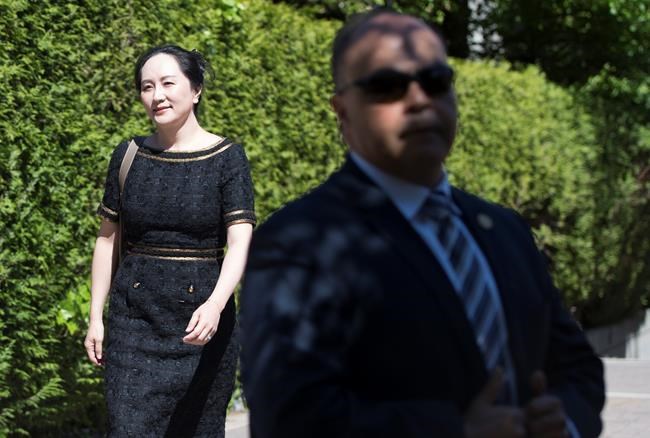Diplomat say documents too sensitive to give to Meng’s legal team
Advertisement
Read this article for free:
or
Already have an account? Log in here »
To continue reading, please subscribe:
Monthly Digital Subscription
$0 for the first 4 weeks*
- Enjoy unlimited reading on winnipegfreepress.com
- Read the E-Edition, our digital replica newspaper
- Access News Break, our award-winning app
- Play interactive puzzles
*No charge for 4 weeks then price increases to the regular rate of $19.00 plus GST every four weeks. Offer available to new and qualified returning subscribers only. Cancel any time.
Monthly Digital Subscription
$4.75/week*
- Enjoy unlimited reading on winnipegfreepress.com
- Read the E-Edition, our digital replica newspaper
- Access News Break, our award-winning app
- Play interactive puzzles
*Billed as $19 plus GST every four weeks. Cancel any time.
To continue reading, please subscribe:
Add Free Press access to your Brandon Sun subscription for only an additional
$1 for the first 4 weeks*
*Your next subscription payment will increase by $1.00 and you will be charged $16.99 plus GST for four weeks. After four weeks, your payment will increase to $23.99 plus GST every four weeks.
Read unlimited articles for free today:
or
Already have an account? Log in here »
Hey there, time traveller!
This article was published 13/07/2020 (1978 days ago), so information in it may no longer be current.
OTTAWA – The federal government is trying to block Huawei executive Meng Wanzhou’s access to some documents in her extradition case, arguing in affidavits that disclosing sensitive information would harm national security.
In an affidavit filed in Federal Court, Global Affairs Canada’s director general in South Asia says if sensitive information were released to Meng’s legal team, it could undermine Canada’s diplomatic strategy and may risk harm to Canadian lives.
David Hartman says China regularly blames foreign governments for the consequences of its actions and it’s in Canada’s interest to ensure the management of that relationship isn’t harmed by the disclosure of sensitive information.

“Generally speaking, such disclosure would inflame tensions between the governments of Canada and China, and would, necessarily, provoke a response harmful to bilateral relations and Canadian interests,” says Hartman’s affidavit dated June 26.
Redacted documents between Canada’s spy agency and the FBI over Meng’s arrest in December 2018 have been released, but the Canadian attorney general is arguing against the further release of information at a hearing scheduled for July 27.
The United States wants Meng extradited to face fraud charges over allegations she broke American sanctions against Iran, which she denies.
Hartman’s affidavit points out that after Meng’s arrest two Canadians, Michael Kovrig and Michael Spavor, were detained, and there was a retrial and death sentence for Canadian Robert Schellenberg.
He also mentions that the Chinese government has suspended imports of Canadian canola seed.
“China regularly seeks to blame foreign governments for the consequences of its actions, rather than examining how its own behaviour affects international public opinion,” Hartman’s affidavit says.
That’s why it’s in Canada’s best interests to ensure the complex relationship between the two countries isn’t further damaged by the public disclosure of sensitive information, the document says.
China charged both Kovrig and Spavor with spying last month, accusations U.S. Secretary of State Mike Pompeo called groundless.
Another affidavit filed by Michel Guay, an officer with the Canadian Security Intelligence Service, says if the information is released it could identify informants or relationships with other intelligence agencies, injuring national security.
Guay’s affidavit says he doesn’t know what’s in the redacted portions of the documents and didn’t prepare the information given to Meng’s lawyers, but secrecy is essential in security intelligence matters.
“The requirement for secrecy is to protect the integrity of past, present and future investigations, as well as to protect the integrity of the methodologies or capabilities of the service.”
Meng remains out on bail, living in her Vancouver home, while her extradition case continues before a B.C. Supreme Court judge.
This report by The Canadian Press was first published July 13, 2020.







